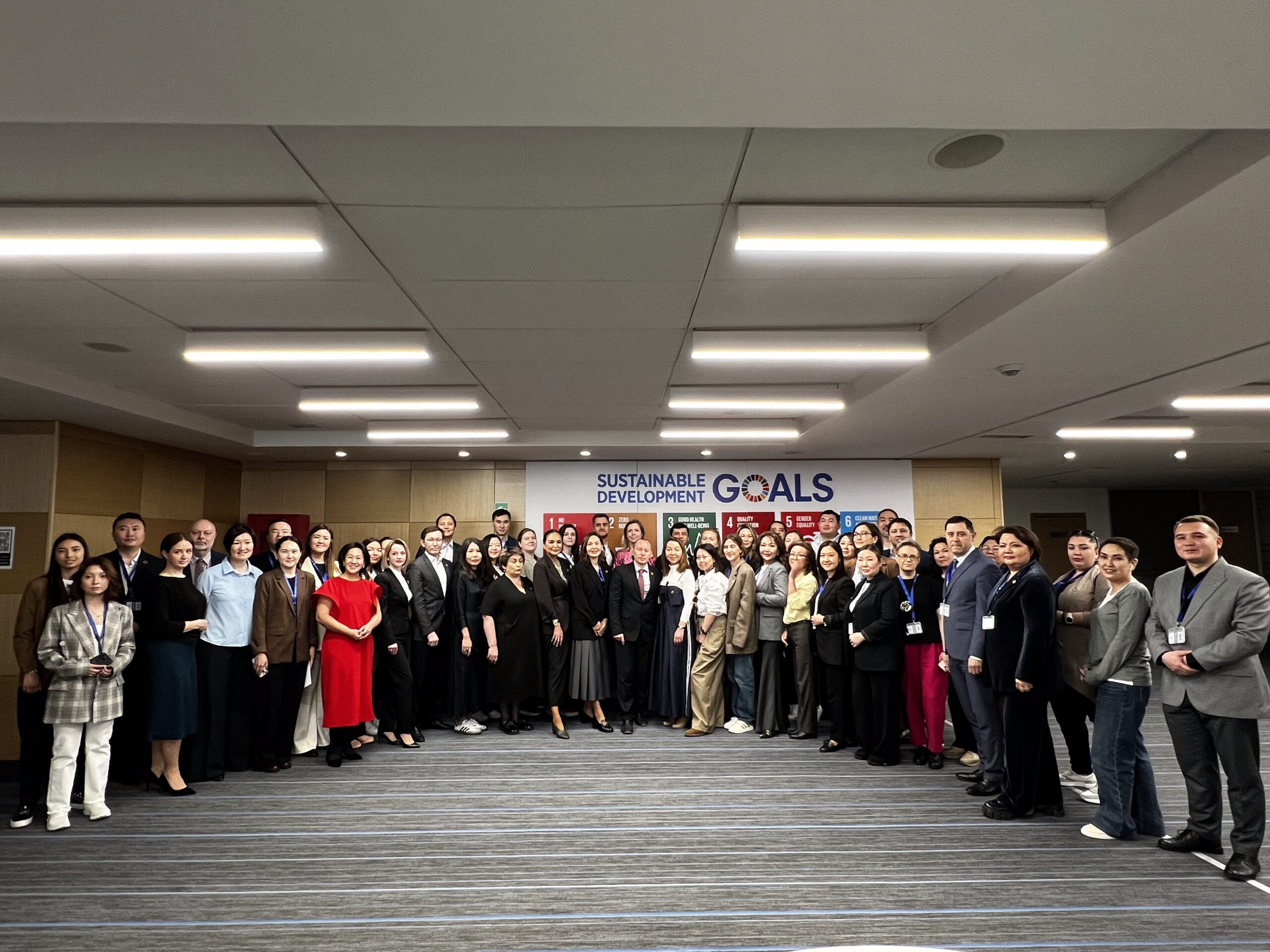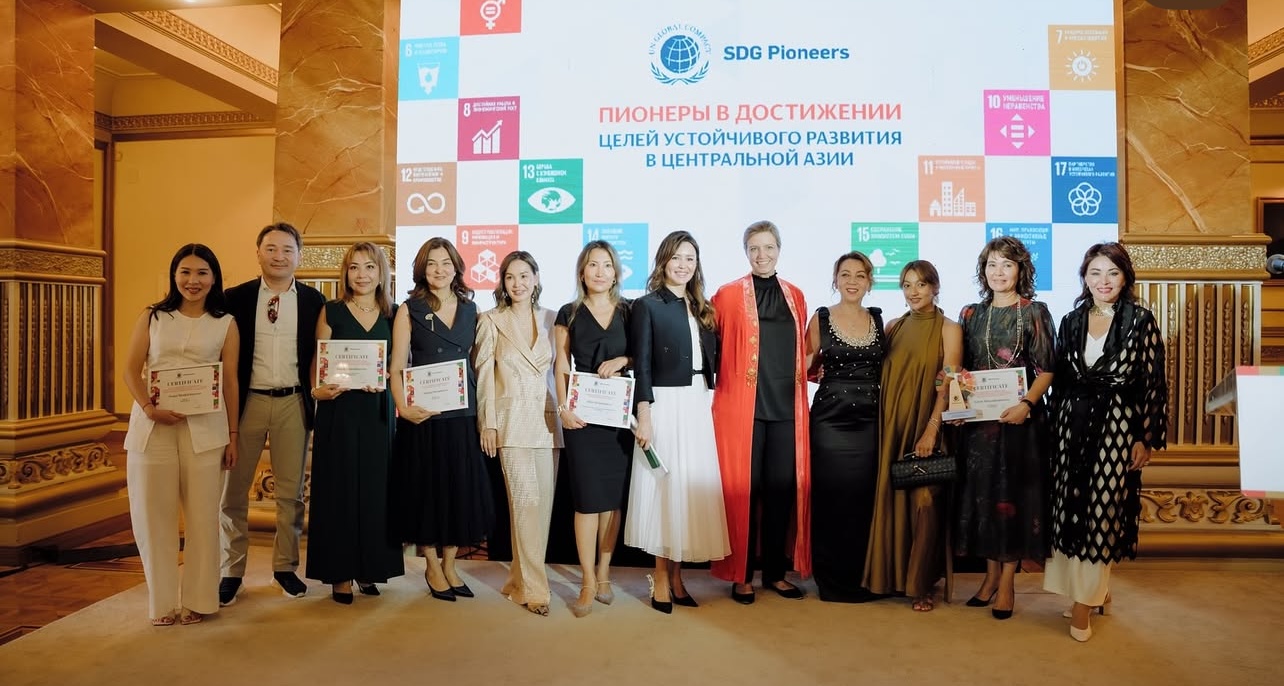ASTANA – Kazakhstan has made significant strides in integrating sustainable development within its private sector. According to the 2024 UN Sustainable Development Report, the country ranked 66th out of 167 nations in the 2023 Sustainable Development Goals (SDGs) Index, reflecting its growing commitment to responsible business practices.

UN in Kazakhstan team and UN Global Compact Advisory Committee members. Photo credit: UN Kazakhstan
The Astana Times spoke with Dinara Seijaparova, the UN Global Compact country manager in Kazakhstan, and Dina Khassenova, the deputy head of the UN Resident Coordinator’s Office, to explore Kazakhstan’s progress and new sustainability initiatives.
A surge in sustainable business practices
“Our business wants to match or go ahead of what is happening in the world with responsible business. The private sector aspires to be globally responsible, with hundreds of companies integrating Environmental, Social, and Governance (ESG) principles into their work. They are committed to supporting the SDGs, a global pledge made in 2015 to eradicate poverty and hunger, protect human rights, and safeguard the environment,” said Seijaparova.
Founded in 2000, the UN Global Compact is the world’s largest corporate sustainability initiative, with over 18,000 businesses and 3,000 stakeholders across more than 160 countries. Its focus areas include human rights, labor standards, environmental protection, and anti-corruption.

Participants of the SDG Accelerator. Photo credit: UN Kazakhstan
Seijaparova highlighted the rapid growth of the UN Global Compact in Kazakhstan, where membership soared from just seven companies to 104 in one and half years. This surge, she noted, stems from increasing awareness of the SDGs and the practical support provided through Global Compact programs.
“Companies are recognizing the value of embedding sustainability into their operations, not just as a moral imperative but also as a driver of long-term success,” she said.
In her view, sustainability is an opportunity rather than an obligation, offering businesses a chance to drive innovation, enhance competitiveness, and build a more sustainable future.
Recognizing a growing interest in sustainability beyond Kazakhstan, the UN Global Compact has expanded to other Central Asian nations. This led to the establishment of a regional advisory committee to oversee the program’s growth across the region.
“Central Asia is deeply interconnected—businesses and communities learn from one another. That is why we decided to work together,” Seijaparova said. “The advisory committee is remarkably diverse, bringing together CEOs of banks, financial institutions, government representatives, and civil society leaders. It is a unique platform where like-minded professionals committed to sustainable development exchange insights and serve as role models for others.”
Accelerating the SDGs through corporate initiatives
Khassenova highlighted the SDG Ambition Accelerator, a six-month educational program launched in October 2023. The initiative helps companies integrate SDGs into their business strategies, making them more responsible toward people, communities, and the planet.
“As a result, some companies have introduced sustainability reports, while others are developing plans to reduce carbon emissions, enhance diversity and inclusion, and improve waste management. At the same time, we encourage ambitious goal-setting, so we do not expect immediate results,” she said.

SDG Pioneers Award. Photo credit: UN Kazakhstan
Global Compact has conducted two training series under the SDG Ambition Accelerator and also led initiatives such as the Business and Human Rights Accelerator and Climate Ambition Accelerator. These programs have engaged over 130 companies and 400 representatives from Kazakhstan, Uzbekistan, and the Kyrgyz Republic, reflecting a regional shift toward responsible business practices.
“Businesses in Kazakhstan care about people and the environment. They only need support and guidance and want to see international best practices—exactly what we aim to provide,” added Khassenova.
Another initiative’s key highlight is the SDG Pioneers competition, which for the first time in Central Asia recognized individuals championing sustainability within their companies.
“In July 2024, we awarded the first-ever SDG Pioneers in Central Asia. These are individuals—often company directors who can introduce new policies, set ambitious sustainable goals, and develop sustainable strategies, but it is not always a director. Employees also can create sustainable innovations such as proposals for increasing energy savings, reducing emissions, and more efficient use of resources,” said Khassenova.
She underscored the critical role of the private sector in driving sustainable development.
“As one of the largest employers, it defines whether products are made sustainably, whether workplaces are safe and ethical, and whether economic growth benefits workers and consumers alike,” she said.
